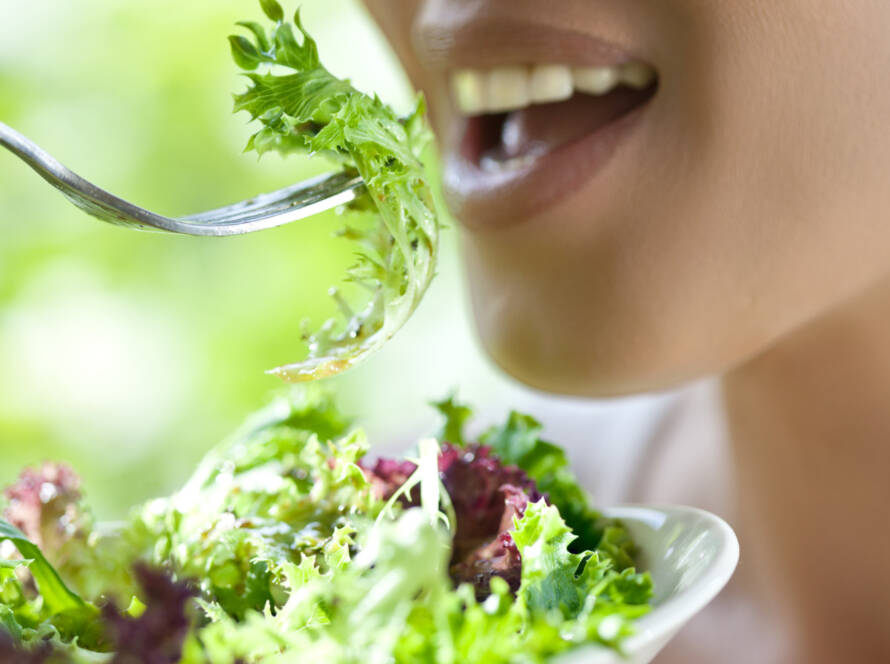A Healthy start of the day with appropriate drink and accompaniments sets the tone for the entire day.
Our body needs a drink after a night’s sleep. While sleeping we lose varying quantities of water from our body through respiration. This makes us “Dehydrated” when we wake up. To have a good day, we should begin the day with a Refreshing Morning Drink. The drink could be water extract, tea, herbal infusion, fruit or vegetable blend.
Our health status and lifestyle vary and so does our fluid requirements. The following article gives details of a variety of morning drinks. You may choose the drink based on your own taste, preference, health status, body needs and lifestyle.
Benefits of Early Morning Drinks
- Rehydration
- Detoxification
- Bowel regularity
- Boosting Immunity
- Therapeutic benefit
Preparation & Health Benefits of Water Extracts

|
Extract |
Method of Prep |
Health benefits |
|
Warm water + Lemon |
1 glass warm water |
|
|
Carom (Ajwain) Water |
Boil 1 cup water |
|
|
Coriander water |
Soak 1 tsp seeds in 1 glass |
|
|
Cinnamon water |
Boil 1 cup water |
|
|
Fennel water |
Boil 1 cup water |
|
|
Fenugreek (methidana) water |
Soak 20 gm seeds in 100 ml water overnight. Strain & drink. |
|
|
Kadha |
4 cups water |
|
Water Extracts to Avoid
|
Extract |
Reason to avoid |
|
Cumin water |
Active compounds are not released in water extract. However, cumin whole / powder helps to improve indigestion, increases antioxidants, eases bowel movements and solves flatulence, belching & burps. |
|
Water with Apple cider vinegar |
It is believed that it can aid weight loss, blood sugar control and can increase HDL, lower TG and cholesterol. But these claims are not backed by scientific research. It is highly acidic & may result in decreased potassium levels, throat irritation and allergic reactions. |
Tea

Whether green, black or white, tea is full of natural substances, called polyphenols, that may help to reduce the risk of certain chronic diseases. All teas are made from the same plant. The unique flavor profile of each tea is due to the difference in processing the leaves of the Camellia sinensis plant.
White tea – leaves are picked & harvested when the buds are still covered by fine white hair. Leaves are then steamed quickly. It has the most potent anticancer properties compared to other teas.
Green tea – Freshly harvested leaves are immediately steamed to prevent oxidation of polyphenols & then dried. It has high levels of polyphenols and is beneficial for prevention of heart diseases, neurodegenerative diseases & cancer.
Black tea – Leaves are rolled & oxidized before drying. They have lower concentration of polyphenols than green tea. All teas contain caffeine but the quantity is less than coffee. Black tea has more caffeine than green tea. However, the caffeine content also depends on the brewing process. The longer the tea is steeped, the greater the caffeine content.
Herbal infusions
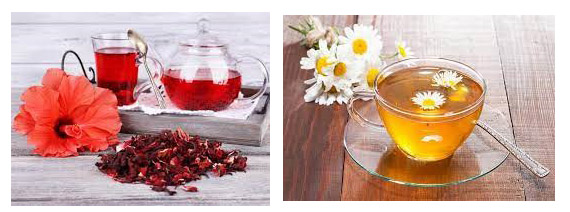
These beverages are made from infusion of herbs, leaves, flowers or other plant material in hot water. These have lower concentration of antioxidants than green, white and black tea. They do not have caffeine and have varying therapeutic benefits.
Preparation of Herbal infusions
Use 1 tsp of dried herb or 2 tsp of fresh herb. Pour boiling water over the herb. Cover & infuse for 5 min. Strain before drinking.
|
Type |
Health Benefits |
|
Rosemary leaf |
Boosts immunity, improves blood circulation, increases alertness, eases headache & indigestion |
|
Chamomile |
Eases indigestion, calms nerves, reduces anxiety, aids sleep |
|
Thyme |
Good for digestion, cold, flu, bronchitis, ear ache, sinusitis |
|
Peppermint leaf |
Controls nausea, treats colds & flu. Aids digestion & relieves flatulence if taken after meal |
|
Raspberry leaf |
Helps to reduce throat infection and increases milk production in lactating women |
|
Hibiscus flower/leaf |
Diuretic, controls BP and blood sugar levels |
|
Jasmine flowers |
Boosts immunity, anti-bacterial |
Fruit / Vegetable Juice

Juicing extracts the juice from fresh fruits or vegetables. The liquid contains most of the vitamins, minerals and phytonutrients found in the fruit. However, whole fruits and vegetables also have healthy fibre, which is lost during juicing. Blending the edible parts of fruits and vegetables produces a drink that contains more healthy phytonutrients and fiber which helps you feel full.
|
Juice |
Health benefits |
|
Tender coconut water |
Hydrating, relieves constipation, treats childhood diarrhea, gastroenteritis, cholera, digestive disturbances, fatigue, heatstroke & urinary tract infections |
|
Gooseberry (Amla) juice |
Relieves constipation, anti-inflammatory, boosts immunity, heals ulcers, controls diabetes, useful in respiratory disorders, controls diarrhea & dysentery, prevents aging and boosts hair growth |
|
Aloe Vera juice |
Hydrating, relieves constipation, anti- inflammatory, improves digestion, treats stomach ulcers, controls blood sugar levels & cholesterol |
|
Bittergourd (Karela) juice* |
Improves blood sugar levels and blood lipid profile |
|
Veg & Fruit blend |
Blended fruits and vegetables retain all their fibre for healthy digestion & satiety besides being rich in antioxidants. Helps create a slow, even release of nutrients into the bloodstream and avoids blood sugar spike. |
Juices to avoid
|
Juice |
Reason to avoid |
|
Bottle gourd (Ghia) |
Bitter tasting bottle gourd contains toxic compounds called cucurbitacin, which may lead to symptoms such as abdominal pain, vomiting, diarrhea, hematemesis, shock, and even death. |
|
Wheatgrass juice |
Various health benefit claims made are not backed by scientific research. |
|
Carrot juice |
Less beta carotene in carrot juice than steamed carrots. |
|
Tomato juice |
Cooking of tomato transforms natural lycopene to a form that is easier to utilized by the body than raw juice. |
Healthy Additions to Early Morning Drinks
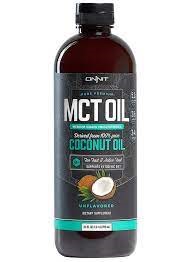
MCT is a fraction of coconut oil from which almost all the long chain triglycerides are removed. It is odorless, tasteless and soluble in water. It is digested and absorbed easily. It is good for mental clarity and focus, improves cognitive health and slows the effects of dementia in people prone to Alzheimer. It is also beneficial for people who have fat malabsorption.
Chia seeds
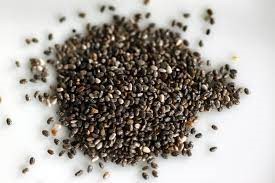
Chia Seeds are rich in omega 3 fats, essential amino acids, insoluble fibre, calcium, phosphorus, magnesium, protein and boron. They are easily digested, absorbed & transported to cells during rapid periods of growth-in children & adolescents, pregnant and lactating women, elderly, athletes & sportsperson. It helps to control diabetes, dyslipidemia, hypertension, is anti-inflammatory, laxative, anti-depressant, anti-ageing, analgesic, vision and immunity booster.
Green cardamom powder
It is anti-bacterial & anti-inflammatory and protects against periodontal infections (gums & jawbone) which may be a risk factor for heart & lung disease
Healthy Accompaniments – Leaves
Holy Basil (Tulsi) Leaves
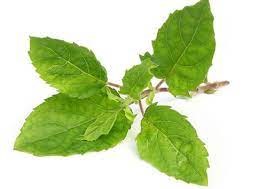
These act as tonic for the entire body and are beneficial for fever, stress, heart, diabetes, detoxification, kidney stones & as a diuretic. It is advised not to chew tulsi leaves as they tan the teeth due to mercury present in them.
Almonds

These are a rich source of protein, fibre, MUFA, Vit E, calcium, magnesium and zinc. Raw almond with skin is rich in fibre and acts as a prebiotic. On soaking almonds, the nutrients become easily available. Acrylamide – a carcinogen can form in roasted almonds. So, it is advisable to roast almonds at a temperature below 130 degree C.
Walnuts
It is the best nut with ideal ratio of omega-3 : omega-6 fats. It is rich in protein, fibre, calcium, potassium and magnesium.
Dates

Dates are rich in sugar, insoluble fibre, potassium, iron, calcium, magnesium, Vit C, selenium, zinc, manganese, Vit B6 and anti-oxidants. They provide instant energy, relieve constipation, prevent GI disorders, control blood pressure & anemia, maintain bone health & healthy neurological system, boost immunity and have anti-inflammatory & anti-tumor effect.



